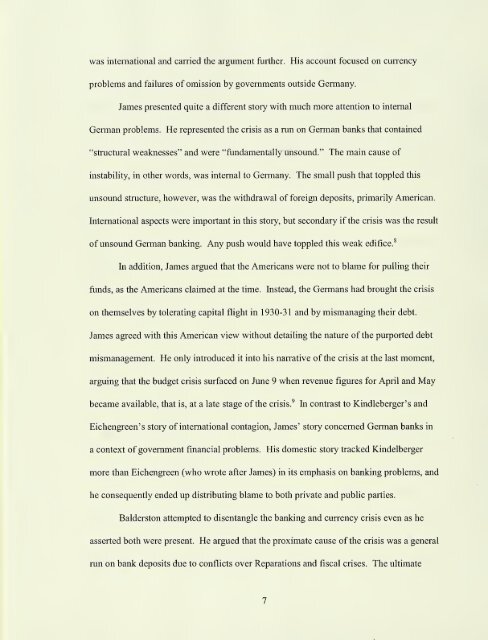Made in Germany : the German currency crisis of July 1931
Made in Germany : the German currency crisis of July 1931
Made in Germany : the German currency crisis of July 1931
You also want an ePaper? Increase the reach of your titles
YUMPU automatically turns print PDFs into web optimized ePapers that Google loves.
was <strong>in</strong>ternational and carried <strong>the</strong> argument fur<strong>the</strong>r. His account focused on <strong>currency</strong><br />
problems and failures <strong>of</strong> omission by governments outside <strong><strong>German</strong>y</strong>.<br />
James presented quite a different story with much more attention to <strong>in</strong>ternal<br />
<strong>German</strong> problems. He represented <strong>the</strong> <strong>crisis</strong> as a run on <strong>German</strong> banks that conta<strong>in</strong>ed<br />
"structural weaknesses" and were "fundamentally unsound." The ma<strong>in</strong> cause <strong>of</strong><br />
<strong>in</strong>stability, <strong>in</strong> o<strong>the</strong>r words, was <strong>in</strong>ternal to <strong><strong>German</strong>y</strong>. The small push that toppled this<br />
unsound structure, however, was <strong>the</strong> withdrawal <strong>of</strong> foreign deposits, primarily American.<br />
International aspects were important <strong>in</strong> this story, but secondary if <strong>the</strong> <strong>crisis</strong> was <strong>the</strong> result<br />
<strong>of</strong> unsound <strong>German</strong> bank<strong>in</strong>g. Any push would have toppled this weak edifice. 8<br />
In addition, James argued that <strong>the</strong> Americans were not to blame for pull<strong>in</strong>g <strong>the</strong>ir<br />
funds, as <strong>the</strong> Americans claimed at <strong>the</strong> time. Instead, <strong>the</strong> <strong>German</strong>s had brought <strong>the</strong> <strong>crisis</strong><br />
on <strong>the</strong>mselves by tolerat<strong>in</strong>g capital flight <strong>in</strong> 1930-31 and by mismanag<strong>in</strong>g <strong>the</strong>ir debt.<br />
James agreed with this American view without detail<strong>in</strong>g <strong>the</strong> nature <strong>of</strong> <strong>the</strong> purported debt<br />
mismanagement. He only <strong>in</strong>troduced it <strong>in</strong>to his narrative <strong>of</strong> <strong>the</strong> <strong>crisis</strong> at <strong>the</strong> last moment,<br />
argu<strong>in</strong>g that <strong>the</strong> budget <strong>crisis</strong> surfaced on June 9 when revenue figures for April and May<br />
became available, that is, at a late stage <strong>of</strong> <strong>the</strong> <strong>crisis</strong>. 9 In contrast to K<strong>in</strong>dleberger's and<br />
Eichengreen's story <strong>of</strong> <strong>in</strong>ternational contagion, James' story concerned <strong>German</strong> banks <strong>in</strong><br />
a context <strong>of</strong> government f<strong>in</strong>ancial problems. His domestic story tracked K<strong>in</strong>delberger<br />
more than Eichengreen (who wrote after James) <strong>in</strong> its emphasis on bank<strong>in</strong>g problems, and<br />
he consequently ended up distribut<strong>in</strong>g blame to both private and public parties.<br />
Balderston attempted to disentangle <strong>the</strong> bank<strong>in</strong>g and <strong>currency</strong> <strong>crisis</strong> even as he<br />
asserted both were present. He argued that <strong>the</strong> proximate cause <strong>of</strong> <strong>the</strong> <strong>crisis</strong> was a general<br />
run on bank deposits due to conflicts over Reparations and fiscal crises. The ultimate



